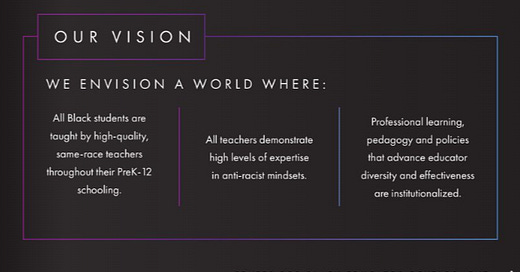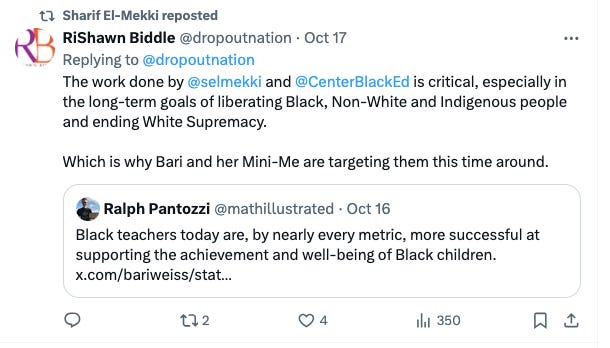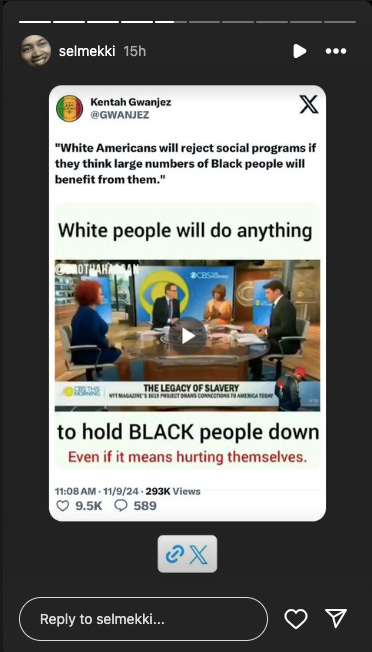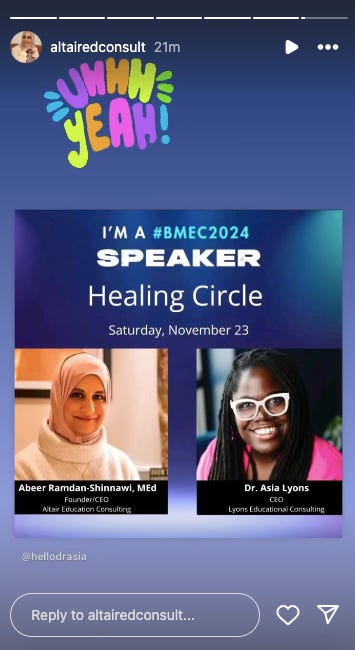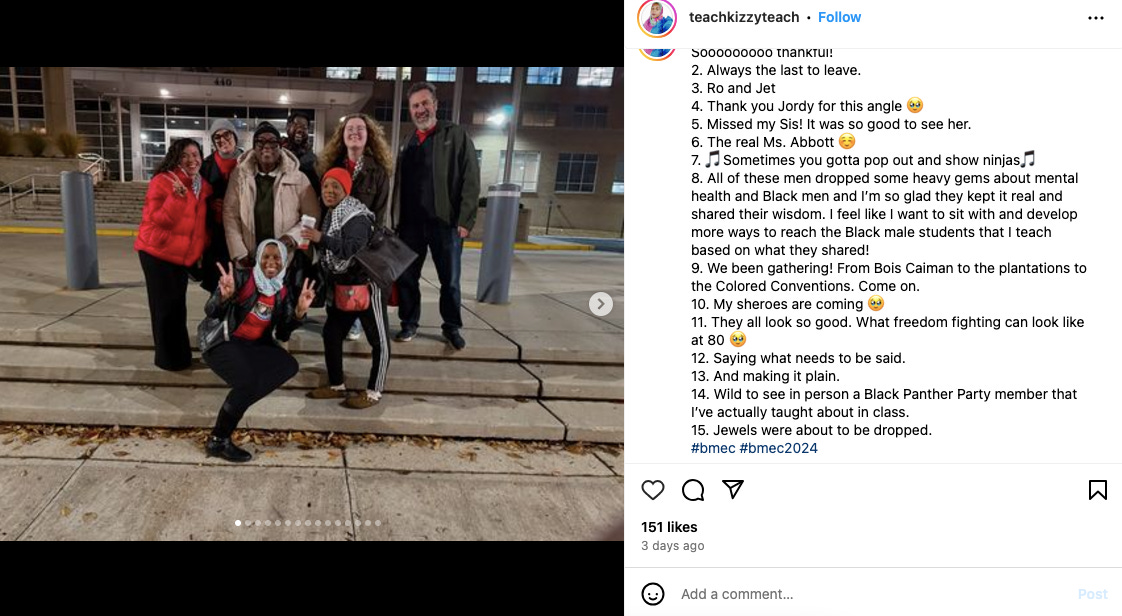Sharif El-Mekki's Annual Black Male Educators Conference Features Extremists and Anti-Israel Hate
Former Black Panthers called on teachers to continue their mission to turn scholars into activists.
Last month, the Jewish Institute for Liberal Values released a report on Sharif El-Mekki’s “Center for Black Educator Development.” The report detailed the CBED’s goal of training black educators in “black pedagogy”, ensuring that “all black students are taught by high quality same-race teachers throughout their K-12 education”, and that they train teachers to be “educator-activists” who see “teaching as a political act.”
The Free Press reported on the story - detailing El-Mekki’s role in Governor Josh Shapiro’s transition team as well as the funding that his organization receives from the city of Philadelphia:
“In addition to his big nonprofit donors, El-Mekki’s organization has secured at least $560,000 in contracts from 2022 to 2024 with the Philadelphia School District—the twentieth largest in the country—to run summer school programs that teach “a culturally responsive, affirming, and sustaining early-literacy curriculum” to “address educational inequalities and our nation’s racist history.” CBED is now expanding outside Pennsylvania, inking contracts with school districts in Fresno, California, San Antonio, Texas, and New York City.”
In the “Respecting Educator-Activists of Color: The Anti-Racist Guide to Teacher Retention” developed by the CBED with the apparent support of the Pennsylvania Department of Education to help school districts retain black teachers- CBED defines educator-activists as the following:
An educator-activist is one “whose viewpoints and teachings are based on the understanding that educational justice and racial justice are intertwined (p.16).”
Educator-Activism is further defined -
“EDUCATION ACTIVISM A practiced commitment to liberating education from the racism inherent in America’s institutions, including our schools, that continue to deny educational equity and prescribe compromised learning and academic outcomes for Black students and, as a result, compromise the humanity of all (p.16).”
“Our goal in preparing this guide is to help you retain educators of color, especially educator-activists-of-color who believe: that teaching can be a form of activism, every lesson plan is a political document, and every classroom interaction a political statement. Educators who understand their role as freedom seekers and fighters fueled by their love for each and every one of their students (p.16).”
The guide tells districts to seek black teachers with a particular political ideological bent and provides them with a checklist for hiring teachers (pp.16- 17):
In CBED’s 2022 report on its Pilot Teaching Academy program, the organization said the following:
“We seek to develop in our students a greater interest in pursuing teaching as an act of social justice and servant leadership(p.2).”
The CBED developed its own curriculum “LeCount-Catto curriculum” which is based on black pedagogy and historical frameworks and helps students make the connection between teaching and activism. Activist-Educators at CBED talk about the curriculum on EdPost podcast, below are quotes from the podcast:
The curriculum drives the idea of “communal learning …this idea that’s counter to rampant individualism and the spirit of capitalism that permeates the learning process where it’s like about your individual merit and your individual success.”
The curriculum is “grounded in rules to be present within the space of like understanding the current context which in this case is education - how did education really come to be what it is right now, what are the factors that led to that and what are the like the roots of how education became what we are currently look at. But then thinking beyond that, being present throughout like the history of time and space, not to be all mystical, but like going back to fundamentally the process that people of African descent engaged when they were thinking about what it looks like to pass on knowledge before there even had to be consideration of liberation. We were free to do what we self-determined ourselves to do , what was that education process like, what were the objectives, how do we start to look back at the values that were held in that space and the way that people operate when they are free and think about what can be reiterated in the present so that we can practice freedom as self-determined human beings today but also use whatever tools necessary in order to engage with the current oppressive reality and resist that so we do a whole lot um throughout the curriculum. The curriculum itself is two years long the reiteration with every unit in every lesson is based on those principles and that idea what does it mean to really be a liberated human being in this current context what does it feel like to be able to really stand on the historical processes that our ancestors have established for us and our elders have trained us in and then how do we use that in order to create a better reality.”
“The curriculum is designed to help folks uh understand what to avoid what to embrace what to learn and what to unlearn in order to be a liberatory educator - you know these are things that i feel like i like that in many cases we kind of as particularly as like africans in america um we tend to fall into education like we happen to come across the right people the right institutions the right realizations to be like hey you know what this is probably something i want to do or we have the right privileges um but many of us aren't afforded that and i think it's about expanding and being intentional about expanding that privilege right by creating a curriculum that does those things…”
“…made me think of some of the students that we currently have in liberation academy and thinking about that that unlearning process and that identification like once they have that awareness it's like oh oh no like this is oppressive you are oppressing me you are in my way like you are not here to help me and they're not like um that light coming on is like a it's bittersweet you know because you are thankful that the students that you have and care about are now equipped to be to face what's going on around them but also it's that realization of like i i've been harmed you know like there were people in my space around me who did not mean my highest good in the space that is supposed to be for my highest development and that that's rough but what they are encouraged to do beyond that is start to act like no we can't that's not going to happen to my my little cousin or it's not going to happen to the grade after me like now we need to like mobilize in order to do something different.”
“... providing an alternative to this western context that we are surrounded by is crucial.”
The focus on “black pedagogy” and training educators to see themselves as political activists comes as no surprise once you learn that El-Mekki was raised within Black Panther “freedom schools” and his parents were in the Black Panther party.
His family were supporters of the Ayatollah Khomeini. He and his family moved to Iran by invitation of the Ayatollah and El-Mekki completed his Middle School there.
“During the Islamic Revolution in Iran, Sister Aisha was intrigued by the integrity, spirituality, and fighting spirit of the leader of the movement, the late Imam Khomeini. With her husband and her best friend, meetings were established to discuss Islam and the situation in Iran. They conversed with Iranians to learn more about the revolution. Eventually, Sister Aisha and Brother Yahya decided to move overseas to Tehran, joining her lifelong friend (since 4th grade), Mama Shakurah, already living there. Sister Aisha said she moved there for several reasons. She wanted her children to witness a country united in its efforts to make a change. She wanted them to experience living in a Muslim country. And, she wanted a safe environment to raise her black boys. She loved that Imam Khomeini continuously stood up to the bully without any fear. He called out the oppression of America and other superpowers. When the revolution happened, Iran seized the U.S. Embassy and took the conspiring spies working there as hostages. Yet, Imam Khomeini ordered the release of all of the African-Americans and women. He stated that they had suffered enough oppression at the hands of the United States. Sister Aisha was amazed that across the world there were people of faith and a leader who could deeply comprehend the plight and struggle of African-Americans. She would visit Imam Khomeini with her dear friend Sister Shakurah and her son Mikyeil. As she told the story, she was so vehemently overwhelmed at that moment that she found herself frozen and clinging to a pillar. Eventually, security had to help her to leave.”
The ties to Iran seem to have made a big impression on El-Mekki. Here he is comparing Iran and the United States on a recent podcast:
“Islam didn't separate itself from politics because creating poverty is a political decision. Denying people education is a political decision. Deciding who gets to eat, who has access, equity, all of that are political decisions. And so how can you be led by faith and say, "I'm going to do good work, but I'm going to ignore all the conditions that created the conditions for me to have to do this good work." It was combined…. And being in Iran and getting to see even education, how they approach education. And even seeing, I understand why you look today and pound for pound and per capita, Iran produces more engineers and doctors, scientists, than many other countries. To be that small, but there's such an emphasis on education and understanding…Being in a country where a lot of youth have a decision to make. I would say there are other options, but main three options, join the military, go to college, or be a teacher. It's looked at at that level of service to the country to go to a village where they may not even have running water. They may be farmers in these super rural areas, but going there, and this is your kind of Iran Corps instead of AmeriCorps. You go and you're teaching a villager.”
“And so when we think about that in this anti-CRT hysteria, which is really anti-intellectualism, which is synonymous for America anyway. This is America. We're anti-Black and anti-intellectual. We can't burn you at the stake, so we're going to burn your school down. We're going to burn your pedagogical frameworks down. We're going to burn your books. It's other ways to burn things.”
“And so we have to be not only super vigilant about it and finding ways to resist. And we can't rely on our oppressors to give a thumbs up and endorse what we know is liberatory pedagogical frameworks, liberatory teaching, liberatory content. Because every teacher, even Black and beyond, if they're worth their salt, they should constantly be interrogating the curricula …”
“Yeah. Listen, what did Malcolm say? Everywhere is the Deep South if it's south of the Canadian border. So act accordingly.”
El-Mekki’s upbringing has clearly influenced how he views education.
The question remains why an organization advocating such radicalism would receive support from the Governor of Pennsylvania and from the City of Philadelphia.
Last week, the CBED held its annual “Black Male Educators Conference”. JILV warned that the event would host radicals but this did not stop Philadelphia mayor Cherelle Parker from giving an address.
Nor did it stop the Superintendent of the Philadelphia School District, Dr. Tony Watlington Sr.
They shared a stage with Angela Davis. A radical activist with links to the Communist Party and the Black Panthers. Davis is also well known for her virulently anti-Israel stance. Indeed, at a panel on “Teaching for Liberation: Radical Possibilities for Black Male Educators” with fellow former panthers Ericka Huggins and Hamid Khalid, she devoted her time at the conference to talk about activism for Palestine and the “genocide” in Gaza.
To loud applause she said:
“I would like us to reflect for a moment on what’s happening in Palestine. Because, you know, it is the weapons that have been provided by the government of this country that has been responsible…in this genocide that is unfolding in Palestine.”
“Considering the solidarity that has been forthcoming for so many years from Palestine to the black liberation movement…I think this should be an important point..how do we generate further solidarity in relation to the Palestinian people.”
At one point (around minute 13) the moderator asks:
“What do you say to teachers who want to use their roles as teachers and educators to still be revolutionary and liberatory but they are under some constraints so what would you say to the person who wants to be that but even, like you mentioned Palestine. We have people in this room right now who are catching hell for teaching lessons about Palestine.”
Davis: “The first thing I would say is never try to accomplish anything alone. We live in this capitalist society where the individual is always represented as the most important unit of our society but we don’t exist as isolated individuals we all are who are because of our communities. Our responsibility is to create community…first and foremost you think of yourself as a part of a larger community. Part of the process of taking radical action is building a community with whom you are going to do this work and teachers especially…I learned the importance of struggle largely from my teachers.”
Ericka Huggins - “Gaza isn’t the first time…what are we waiting for. All of us have some level of education. Is it what we learned in school or what we learned from..I want to say from our grandmothers and grandfathers.”
“I don’t care if we put the most powerful person, the most compassionate and empathetic person into the office of the US presidency. It’s not..it’s a corrupt office.
At minute 7:29 - the moderator has the audience repeat “it is a corrupt office.”
Hamid Khalid - “As Panthers we were bold and audacious. We realized that work had to begin at the grassroots level. You as educators are on the frontlines now. We are depending on each and everyone of you to carry on the work that we did forward to the next generation, to instil activism in the scholars that sits in each and every one of your classrooms.”
Also appearing at the conference to host a “healing circle” was Abeer Ramadan Shinnawi who was a speaker at last year’s conference.
Here is Shinnawi mourning Yahya Sinwar
And here she is in better spirits preparing for the conference -with a special shout out to extremist group Code Pink:
Also in attendance was Keziah Ridgeway, who has been removed from teaching in class due to alleged threats to Jewish parents.
It is not surprising that Ridgeway should be there given El-Mekki’s outspoken support for her.
This event - featuring blood libel against Israel, anti-Israel activists, activists who have been accused of antisemitism, activists who believe education should be a political and activist endeavour, was sponsored , amongst others, by the National Education Association, UCLA, Pennsylvania Human Relations Commission, Philadelphia Department of Public Health and Philadelphia Public Schools.

